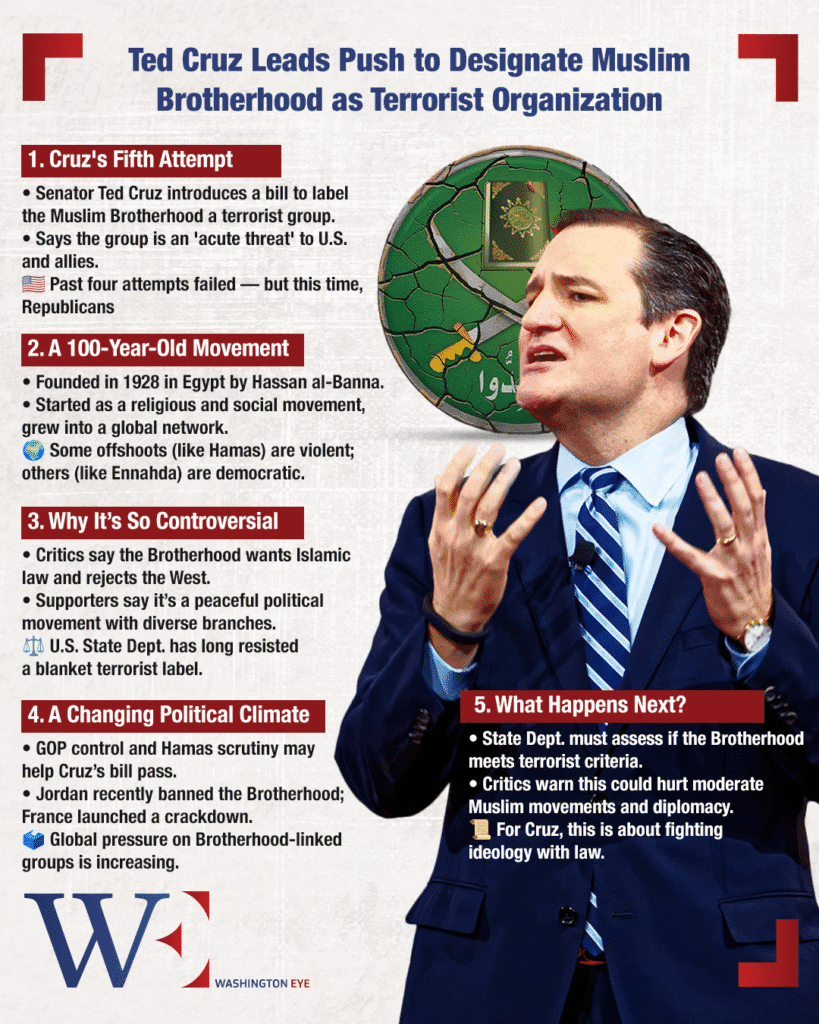From its beginnings in the smoky cafes and mosques of 1920s Egypt, the Muslim Brotherhood has grown into one of the most controversial and misunderstood Islamist movements in the modern world. Now, nearly a century later, it’s under fire not from Arab autocrats or regional rivals, but from lawmakers in Washington D.C. Senator Ted Cruz, a Republican, presented a bill on Wednesday to designate the Brotherhood as a foreign terrorist organization, claiming that it directly threatens U.S. national security and funding Hamas.
Cruz has been a longtime critic of the group and always pressed on the fact that Muslim Brotherhood poses “an acute threat” to America and its allies.
“They are committed to the overthrow and destruction of America and other non-Islamist governments across the world,” he said in a statement. “American allies in the Middle East and Europe have already labelled the Brotherhood a terrorist organization, and the United States should do the same and do so expeditiously.”
This is not Cruz’s first attempt, but sadly the fifth attempt to have named this group as a terrorist organization after all. This time, with Republican control of both chambers of Congress and rising anger over Hamas amid the ongoing war in Gaza, Cruz may have his best chance yet.
The Roots of this Movement
The Muslim Brotherhood emerged in 1928 by Hassan al-Banna, a 22-year-old Egyptian schoolteacher, in response to the Ottoman Empire’s downfall and growing Western colonial power in the Arab world. Al-Banna saw the Brotherhood as a social and religious revivalist movement rooted in Islam that would oppose Western culture and secularism. Ironically, the organization was focused on education, charitable work, and religious outreach. But, the organisation swiftly grew into a major political and ideological power in the Arab world in no time. Its slogan, “Islam is the solution,” expressed a vision of a society governed by Sharia law. Over the decades, the Brotherhood’s model has inspired branches and supporters in Jordan, Tunisia, Gaza, and Sudan. Some of these branches, like Hamas in Gaza, have taken up crucial acts of violence and are already classified as terrorist organisations by various nations. Others, such as Tunisia’s Ennahda Party, have followed democratic principles.
The Brotherhood’s most dramatic political rise came after the 2011 Arab uprisings, when it won elections in Egypt and briefly governed the country through President Mohamed Morsi. But in 2013, the Egyptian military removed Morsi from power following mass protests. The Brotherhood was banned shortly afterward and declared a terrorist organization by Cairo. Other countries that followed were UAE, Saudi Arabia, and Russia have all labeled the group a terrorist organization.
New Push in a Shifting Political Climate
This time it’s Cruz’s fifth effort to officially classify the Brotherhood as a terrorist organisation. Previous efforts had utterly failed under both Republican and Democratic administrations, with the State Department constantly claiming that the Brotherhood’s organisation is too broad and that its affiliates differ greatly in principle and behaviour. However, with Republicans now controlling both chambers of Congress and Hamas under severe scrutiny during the Gaza war, political realities in Washington may be more favourable to the bill’s passage.
Meanwhile, international pressure on Brotherhood-linked groups is growing. In April, Jordan banned the Brotherhood over an alleged armed plot, and France has launched a crackdown on Brotherhood-linked groups following a government report detailing their influence in European Muslim communities.
What Happens Next?
The bill’s fate is ultimately decided by the State Department, which must evaluate if the Brotherhood fits into the legal requirements for terrorist designation. This includes proof of the group engaging in or promoting acts of terrorism that endanger US citizens or national security. Critics argue that identifying the Brotherhood will damage moderate Islamist movements, limit political debate, and complicate US alliances in the area. But for Cruz and his allies, the threat is ideological and global, and it must be met with legal power.














